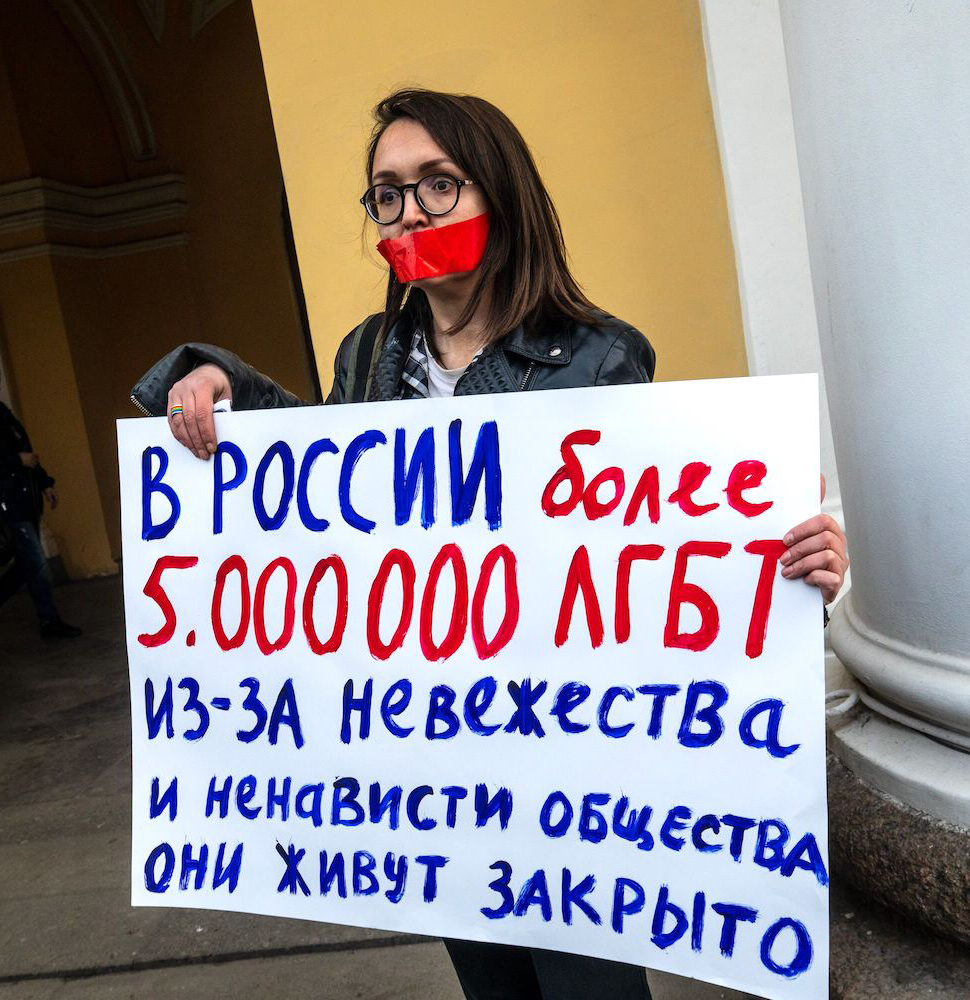I am from Russia and my country is homophobic.
When thinking about Russia, it might not be the first characteristic that comes to mind, but I can assure you that it is one of the most prevalent in describing the contemporary Russian society. Most of my friends with whom I spoke about this issue replied to my concerns saying something along the lines of, “you’re overdramatizing, no one here cares about others’ business.” And I wanted to believe that really badly. But when the anti-LGBT movement, called The Chainsaw, publicly posted a list of LGBT activists they were going to kill, and then took responsibility for the brutal murder of 41-year-old activist Elena Grigorieva that no one got arrested or punished for, I stopped lying to myself. People in my country DO care about the LGBT community. They care so much that the gender of one’s sex partner is the biggest indicator of whether one deserves to live or die.
I didn’t grow up pansexual. I didn’t even know that word. I took my appreciation for all people and their beauty and charm as a part of my excessive friendliness. Only after visiting the U.S. did I start thinking to myself that my attitude towards certain people – especially of my own gender – might have a different underlying reason. It didn’t scare me as I didn’t intend to share my thoughts with anyone who might judge me for that, not even with my parents. When I began dating my girlfriend in Russia it felt like heaven. We complemented each other so perfectly and spent two and a half happy years together. We never revealed our relationship to anyone, so we have never encountered any direct homophobic treatment from people around us. However, my own thoughts and conflicts kept destroying me from the inside.
The whole concept of dating a woman in Russia was frightening to me and also extremely confusing. I was lost in my feelings and emotions and I did not know what to do or how to act. A belief that same-sex relationships are gross and unnatural lived deeply within my head. I couldn’t avoid ideas and opinions I internalized as a child, which led me to constantly doubt myself, question my very being, and eventually lose myself for a long period of time. This, to me, was the scariest and most painful experience of being an LGBT person in Russia. If I had to deal with a crowd of people spitting at me, I would gather all my power and strength to fight for my relationship; but having to fight an endless array of my own preconceptions was much, much harder.
Another struggle that I had to face was the complete absence of any useful information. I would have greatly appreciated a little “How to Be LGBT” guidebook of some sort, but the Russian internet did not offer any. I was in desperate need of answers, approvals, and confirmations, but the only piece of information I could find was my mom’s old book on sex education, where all the information about same-sex relationships could be summarized as the following: “Homosexual men are deeply dependent on the pleasure of having penetrative anal sex and should be treated accordingly to cure this disease.” Having my love called a disease was not helpful whatsoever.
Additionally, I couldn’t help but notice that relationships between women were completely out of the picture in my country’s context. As if relationships between men were nasty, obscene, and really noticeable, while those between women were…nonexistent? Only later, as my relationship progressed and I started noticing what people were saying in real life and on the internet, I realized relationships between women exist in Russia only for the pleasure of men as an exotic, exciting, and extremely sexy fetish. Whenever I refused to “get to know a bit better” yet another man on my social media and used “I have a girlfriend” as an excuse, there was not a single instance when I did not get “Why don’t we do a threesome?”as a response.
In light of the hegemonic Russian notion of toxic masculinity and the image of a strong macho man as the ruler, the dominant, and the ideal, relationships between women are viewed as inferior with no right for existence outside of serving men’s pleasure. Those relationships are expected to be broken down once a man expresses his interest in a romantic relationship with someone from the couple.
Nonetheless, despite all the points mentioned above, I was able to find myself. I built my own little support village, a network of people who understood me or were members of the LGBT community themselves. It was surprising to find out how many LGBT kids there were in my city, and I’m happy that we were able to keep each other strong. Nevertheless, I don’t know if it’s going to get better. If I was able to get out of that self- destructive rabbit hole, it doesn’t mean it’s easy for everyone to do. I can only hope that everyone will find their place in this world and live happily and love happily.
Anonymous is a student from Russia who is currently an undergraduate in an American college.
Featured Image: Russian activist Elena Grigorieva before she was murdered in 2019.

